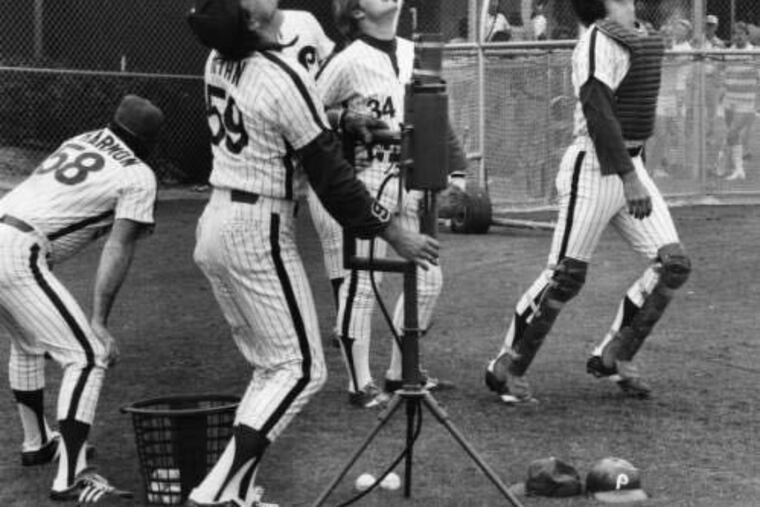Phillies coach ‘Irish’ Mike Ryan was a kind, quiet man who packed a heavy punch | Bob Brookover
Phillies coach “Irish” Mike Ryan, who died Friday at the age of 78, was a great defensive catcher and a coach everyone respected.

Virus permitting, we are going to get an abridged version of the 2020 baseball season -- but one of the most anticipated weekends of the summer for the Phillies will not take place.
The canceled four-game series against the San Francisco Giants from Aug. 7-10 was going to be special. That was when the Phillies planned to celebrate the 40-year anniversary of the first World Series title in team history.
The precious nature of such a celebration was driven home Friday with the news that “Irish” Mike Ryan had died at the age of 78. He was the third coach from the 1980 staff to die since 2017, which was the same year the Phillies lost Dallas Green, the boisterous manager of their title team.
“Irish was one of the people I was really looking forward to seeing,” said Larry Bowa, the shortstop on the 1980 Phillies who later spent six years on the same coaching staff as Ryan. “Just a great guy. He was so loyal to the manager, the staff, and the players, and he was a guy you wanted to be in the trenches with.”
That’s baseball code for brawler. As a backup catcher and bullpen coach for the bulk of his long career, Ryan was usually beyond the outfield walls whenever a fight broke out. But by the time it was over, he was sure to be in the middle of the scuffle.
“His personality was pretty low-key, but somehow people knew you did not want to mess with this dude,” Bowa said. “The only time he’d get angry was when there was a bench-clearing brawl. "
Well, that wasn’t the only time. There are a couple of stories about how “Irish” Mike decked the late Daily News writer Bill Conlin. Details of exactly what happened one night in Pittsburgh are sketchy because no one ever actually saw a punch. But according to Phillies historian Frank Bilovsky, the two men got on the elevator at the Pittsburgh Hilton and when the doors opened on the fourth floor, Ryan walked out and Conlin was on the floor with sections of the Sunday Pittsburgh Press strewn around.
“Apparently it was a one-punch thing and it was over,” former Phillies media relations director Larry Shenk said. “The door opened and Conlin was lying on the floor.”
Bowa witnessed another scuffle between Ryan and Conlin in spring training at the Jack Tarr Hotel, then the team hotel of the Phillies, and now part of Church of Scientology worldwide spiritual headquarters in Clearwater.
“Conlin was writing a lot of stuff about us and Irish didn’t like it,” Bowa said. “He said, ‘Why don’t you back off writing that negative stuff and write something positive about us?‘ Conlin kept writing and one night inside the Jack Tarr Hotel, Irish had a few cocktails and he saw Conlin and cold-cocked him.”
I witnessed Irish the brawler during the 1990 season when Pat Combs drilled Dwight Gooden with a pitch at Shea Stadium, triggering a bench-clearing brawl that continued for some time because of angry outbursts by Darryl Strawberry. As the brawling bodies came off the ground, Andy Musser announced that “there’s Irish Mike in the middle of it. That doesn’t surprise anybody.”
Two years earlier, there was another classic moment involving Ryan out in the bullpen at Shea. With the Mets primed to win their second NL East title in three years, the New York mounted police were in the ballpark for crowd-control reasons. Bruce Ruffin was having some chronic control problems that season and had been moved to a relief role.
Manager Lee Elia called down to the bullpen to tell Ryan to get Ruffin ready.
“Irish says to Lee, ‘You don’t want him up,’ " Bowa recalled. “Lee says, ‘Why not?’ Irish says in his thick New England accent, ‘He just hit the horse in the arse two pitches in a row.’ "
Irish once gave me great advice that I did not heed. He warned me not to play racquetball against Bowa at the hotel in St. Louis.
“He’ll crush you,” Irish said.
I played anyway. Bowa crushed me. Irish could not wait to hear the results when I entered the coach’s room at Busch Stadium that afternoon.
“How’d it go, Bobby?” he asked.
“He killed me,” I reported.
“Of course he did, Bobby,” Irish said. “He’s a professional athlete. You’re not.”
Irish and I also talked often about his home in New Hampshire, where he died last week. He loved it there.
“You couldn’t get ahold of him in the offseason,” Bowa said. “Once the season was over, he was gone until the next one. The other thing about Irish is that he knew how to let games go. Vuke [the late John Vukovich] and I would go over every game after it was over. Irish would get dressed and leave. He cared, but when it was over, it was over. He used to say, ‘Take a shower, wash it off and come back tomorrow.’
“You know Irish was someone who didn’t say much, but when he talked people really listened because he knew what he knew the game really well, and he knew how to teach catching.”
Irish retired at age 53 after the 1995 season, having been a coach on three World Series teams, including the 1980 squad. He rarely returned to Philadelphia after that, but I thought about him often because he was a really good man even though he packed a mean punch.